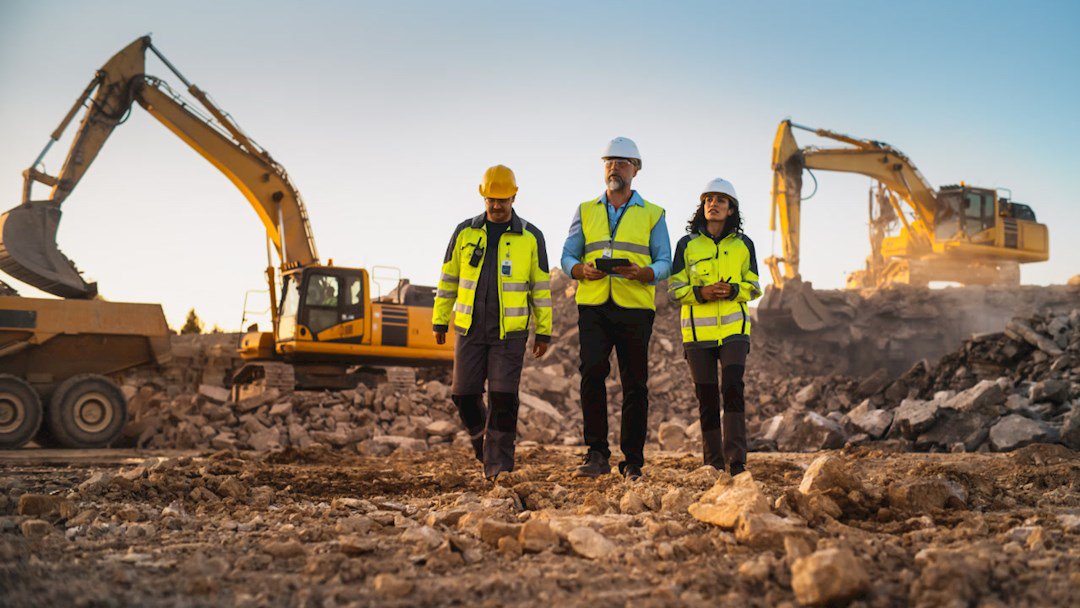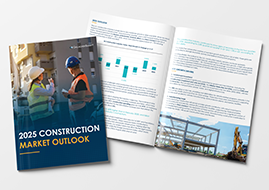By: Chris Carucci Greg Perruzzi

Dec 18, 2024 — The U.S. construction industry is grappling with a multitude of challenges that significantly impact its financial health and operational efficiency. Construction firms must navigate a complex risk landscape and be prepared to manage incidents and subsequent claims. As the industry looks ahead, addressing these multifaceted challenges will be crucial for sustaining growth and ensuring project success.
Workers' Compensation Claims
The construction industry has one of the highest rates of fatalities, injuries, and mental health issues. This rate is due in part to the industry's inherent risk, from working on dangerous jobsites and performing labor-intensive job duties to accessing quality care and abusing treatment that can lead to addiction issues. Workers' compensation claims account for more than 70% of all claims in the construction industry.
In terms of physical injuries, nearly $11.4 billion in annual losses are due to serious nonfatal workplace injuries. The top causes include falls (both from a height and on the same level), overexertion, being struck by objects or equipment, and other exertions or bodily reactions.
| Cause | Cost (in billions) | Percentage of Total |
| Falls to lower height | $3.22 | 28.20% |
| Overexertion involving outside sources | $2.09 | 18.40% |
| Struck by object or equipment | $1.52 | 13.30% |
| Falls on the same level | $1.00 | 8.80% |
| Other exertions or bodily reactions | $0.86 | 7.60% |
(ConstructConnect n.d.)
The way the claims process is handled directly affects the health and timely recovery of the injured person, as well as the total costs the employer incurrs. From the first report of injury to the successful closure of a claim, our highly trained claims professionals actively listen, empathize, and guide workers and employers through the workers' compensation process. Learn more.
Mental and emotional impacts stem from a variety of causes, including stress and mental fatigue from the demanding nature of the job and the effects of physical injuries. While the exact causes of the high rates of construction industry suicide are hard to pinpoint, possible causes include extended periods of overtime work, high-pressure deadlines, time spent away from family, drug and alcohol abuse, and other job pressures. (Pettypiece 2024) (Lorek 2024)
Preventing incidents with appropriate safety and training is ideal, but when incidents occur, there must be an emphasis on effectively treating and triaging injured workers. How workers' compensation claims are handled directly affects the health and timely recovery of the employee, as well as the total costs incurred by the employer. Comprehensive claims handling improves clinical outcomes, reduces lost workdays, decreases litigation, and lowers the overall total cost of risk (TCOR). Read more: Breaking Ground on Solutions: Enhancing the Care and Support for Injured Workers in the Construction Industry
Unforeseen Site Conditions Claims
Unforeseen site conditions claims arise when unexpected physical or environmental factors impact project progress. These conditions often emerge during construction and weren't anticipated during planning.
Causes and Impact
Such conditions can include subsurface obstructions, poor soil quality, hazardous materials, or structural deficiencies. These unexpected challenges can lead to significant delays, increased costs, and safety concerns, potentially requiring changes to project designs or construction methods.
Environmental risk management is one way to help prevent these issues from becoming an even bigger problem. Gallagher Bassett's multi-disciplinary technical specialists provide superior environmental consulting services at every stage of a project's lifecycle. These services includes planning, project oversight, specialized technical support, on-site rapid response in critical situations, and reporting. Learn more or access an overview brochure.
Fraudulent/Ghost Claims
Fraudulent claims, also known as ghost claims, are a growing concern in the insurance industry. These false claims involve staged accidents and unnecessary surgeries and often involve many interconnected parties, such as lawyers and doctors. Fraudulent claims have a significant impact on businesses, leading to higher insurance premiums, financial strain, and a tarnished reputation.
To mitigate the occurrence of fraudulent claims, businesses can implement pre-loss prevention measures, such as access-control technology and safety consultants, or post-loss mitigation strategies, such as immediate response investigations and incident mitigation through surveillance.
By implementing fraud-detection measures, conducting thorough investigations, and establishing strong internal controls, solutions are available to help mitigate the risk of fraudulent claims and protect a company's financial resources and reputation. Read more: Combating Fraudulent Claims.
Defect Claims
One of the most pressing challenges in the construction industry — second only to worker safety — is the rise in construction defect claims. These claims arise when the quality of construction deviates from contractual promises, such as leaky plumbing, foundation cracks, or mold infestations.
Defects in construction can range from minor issues to major structural problems, often leading to costly legal disputes.
Causes and Impacts
- Municipality claims: An increase in claims activity is tied to the $1.2 trillion infrastructure bill passed in 2021. As funds from this bill are distributed, municipalities are seeing more claims, especially in states such as Texas.
- High-end custom projects: A surge in construction defect claims is linked to high-end custom homes valued between $10 million and $15 million. Economic factors such as rising interest rates are playing a role in this trend, increasing litigation about defects in luxury builds.
- Delays and abandonments: Projects being delayed or abandoned are adding to the construction defect claim volume. Issues such as mechanical liens, non-payment, and fluctuating interest rates are creating friction between contractors and property owners, leading to retaliatory defect claims.
Delay Claims
Delay claims are among the most common types of construction disputes, arising when project timelines extend beyond the originally agreed-upon schedule. These delays can result from various factors, such as unforeseen events, contract mismanagement, or insufficient project planning. When delays occur, contractors typically seek compensation for the additional costs incurred due to the disruption.
In 2024, the Associated General Contractors of America reported that 53% of construction firms experienced project delays or abandonments due to rising costs, while more than one-third faced postponements or cancellations caused by increasing interest rates. Additionally, regulatory challenges surrounding infrastructure financing further compounded the difficulty of completing projects on time.
Looking ahead to 2025, recent federal interest rate cuts are expected to lower borrowing costs and stimulate construction activity, potentially reducing delays and project abandonments. However, the impact on the industry may be gradual, as construction is a lagging economic indicator with longer project cycles.
Payment Disputes
Payment disputes are another significant issue in the construction industry, often stemming from disagreements over payment terms, work completion, or financial issues. These disputes can cause financial strain for contractors and hinder project progress.
Causes and Impact
Common reasons include ambiguous contract terms, disputed variations or change orders, and delays in project milestones. Additionally, inadequate documentation or incomplete payment certifications can exacerbate these disputes, resulting in financial difficulties for contractors and strained relationships with clients or subcontractors.
Damage Claims
Damage claims result from physical or financial harm caused by construction activities and include property damage, personal injuries, and financial losses due to construction defects or accidents. In the U.S., 28 weather events exceeded more than $1 billion in damages, setting a new record in 2023.
Incidents ranged from convective storms and tornadoes to hail and heavy rain. As severe weather becomes more frequent and costly, the construction industry could face greater downtime due to supply chain constraints. Even as the supply chain improves, it's often difficult to account for a demand surge, which occurs when a region sees significant requests for similar products or materials, often exceeding the available supply.
Types and Impact
Damage claims may involve property damage (e.g., structural failures or water intrusion), personal injuries onsite (e.g., falls or equipment-related accidents), or financial damages from project delays. These claims can have serious financial and legal consequences for all parties involved.
Conclusion
The U.S. construction industry is currently facing a myriad of challenges that significantly impact its financial health and operational efficiency. From high rates of workers' compensation claims due to the inherently risky nature of construction work, to unforeseen site conditions that can cause project delays and increased costs, the industry must navigate a complex risk landscape. Construction firms must adopt comprehensive risk management strategies, including robust safety training, effective claims handling, and proactive fraud detection measures. Gallagher Bassett delivers partnered claims and risk management solutions designed specifically for the construction industry. Learn more by visiting our industry solutions page.
Authors

Chris Carucci
Sources
ConstructConnect. n.d. Accessed November 2024. www.constructconnect.com/
Lorek, Sarah. 2024. "Mental Health and Suicide Prevention in Construction." Trimble, July 31. constructible.trimble.com/construction-industry/mental-health-in-construction-stats
Pettypiece, Shannon. 2024. "Construction Workers Are Dying by Suicide at an Alarming Rate." NBC News, Jun 23. www.nbcnews.com/politics/economics/construction-workers-are-dying-suicide-alarming-rate-rcna156587
Make Gallagher Bassett your dependable partner
When making the right decision at the right time is critical to minimize risk for your business, count on Gallagher Bassett's extensive experience and global network to deliver.

